
Top Advice for Parents Before the Four Plus Exam
Preparing for the four plus exam can feel like standing at the foot of a mountain—exciting, yet daunting. That’s why clear advice for parents before the Four Plus exam matters so much.
Understanding the ins and outs of this pivotal assessment and knowing how to set little ones up for success can make all the difference. From creating effective study plans to managing test anxiety, we’ll explore strategies that really work.
Ready to take the first step in this journey? Let’s dive into the key advice every parent should know!
What is the Four Plus Exam?
The four plus exam is designed to assess a range of cognitive skills and academic knowledge in children, focusing on key areas like maths, reading, and logical reasoning. It is typically administered to children aged 4 to 8 years and serves as a standardised measure of the foundational skills essential for academic success.
Regarding content, the exam consists of sections that cover numeracy, literacy, and problem-solving abilities. Generally, the test lasts about 1.5 to 2 hours, which allows children to complete it without experiencing undue fatigue.
Prominent organisations, such as the Educational Testing Service, often oversee these assessments, providing a structured framework to evaluate children’s readiness for school. Parents receive access to the results, enabling them to identify their child’s strengths as well as areas that may require improvement.
Importance of Early Preparation
Preparing early for the four plus exam can greatly improve a child’s performance. Research indicates that children who begin their preparation ahead of time score, on average, 15% higher than those who do not. This early preparation not only helps children build confidence but also reduces exam anxiety.
For instance, a study conducted by the National Centre for Education Statistics demonstrates that students who review materials six months prior to the exam not only retain information more effectively but also adapt to the exam formats with greater ease.
It may be beneficial to establish a study schedule, incorporating dedicated time blocks each week. Parents can utilise online resources such as Khan Academy for practice questions or encourage their children to participate in group study sessions to reinforce their learning.
There is also a notable example of a local student who excelled in the exam after adhering to a consistent preparation routine, further underscoring the effectiveness of early preparation.
Understanding the Exam Structure
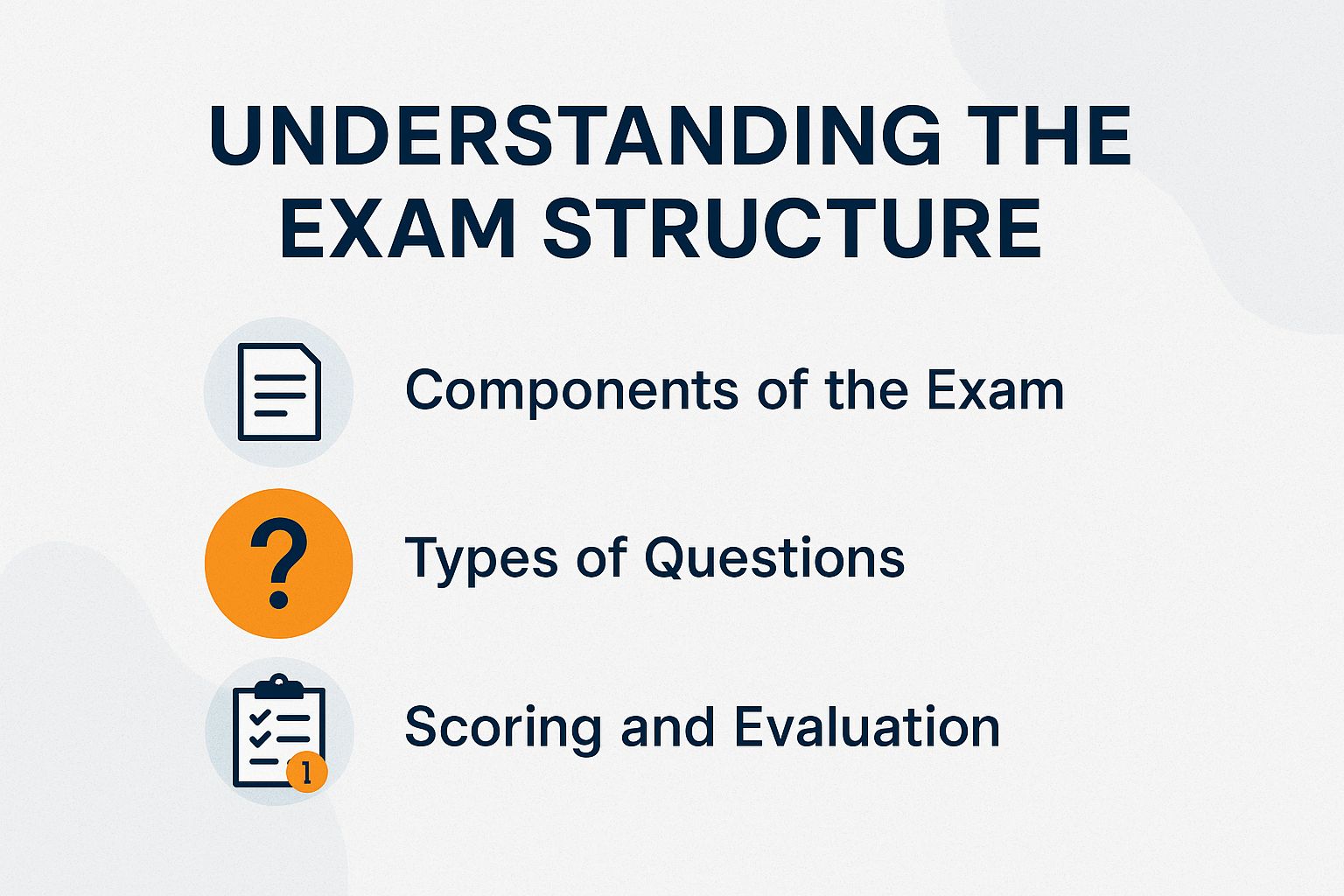
Understanding the structure of the four plus exam is essential for effective preparation. By grasping its format, both parents and students can strategically focus their study efforts, ensuring they are well equipped for success. For further details on entry requirements and preparation, our guide on the Top 50 Grammar Schools in the UK and Their 11+ Entry Requirements offers valuable insights.
Components of the Exam
The four plus exam typically includes three primary components: verbal reasoning, quantitative reasoning, and non-verbal reasoning. Each of these components is designed to measure different cognitive skills.
In the verbal reasoning section, candidates may encounter tasks that involve identifying logical relationships or interpreting written information. The quantitative reasoning portion generally presents problems related to basic arithmetic, algebra, and data interpretation. Meanwhile, the non-verbal reasoning section often features patterns or shapes, assessing the ability to recognise trends without relying on verbal cues.
To prepare effectively for the exam, it is advisable to utilise practice materials available on platforms such as Khan Academy or Magoosh. These resources provide tailored exercises and guidance for each specific type of reasoning question, ensuring a comprehensive preparation experience.
Types of Questions
Questions on the four plus exam can vary widely, ranging from multiple-choice to open-ended formats. This diversity challenges students to effectively demonstrate both their knowledge and reasoning skills.
To excel in this exam, it is advisable to familiarise yourself with the different types of questions. Multiple-choice questions typically assess specific knowledge, while short answer questions require more in-depth explanations and reasoning.
When tackling multiple-choice questions, a useful strategy is to eliminate obviously incorrect answers, as this can enhance your chances of selecting the right option. For short-answer sections, it is important to structure your responses clearly and concisely. Be mindful to avoid common pitfalls, such as overthinking straightforward questions or straying off-topic in open-ended responses.
Practising with past exam papers can significantly boost your confidence and identify areas for improvement, allowing you to approach the exam with a well-thought-out strategy.
Scoring and Evaluation
Scoring for the four plus exam is generally based on a standardised scale, which allows for direct comparisons among test takers and schools. The exam employs a scoring system that utilises percentiles and scaled scores to evaluate performance.
Percentiles rank students in relation to their peers, indicating the percentage of students who scored lower.
For instance, if a student is in the 85th percentile, it means they performed better than 85% of the other test-takers. Scaled scores, on the other hand, convert raw scores into a consistent scoring range. This approach simplifies the assessment of proficiency levels.
The evaluations from this exam can have a significant impact on educational placements, influencing decisions regarding advanced classes or additional support. Ultimately, these assessments help guide students on their unique learning paths.
Creating a Study Plan
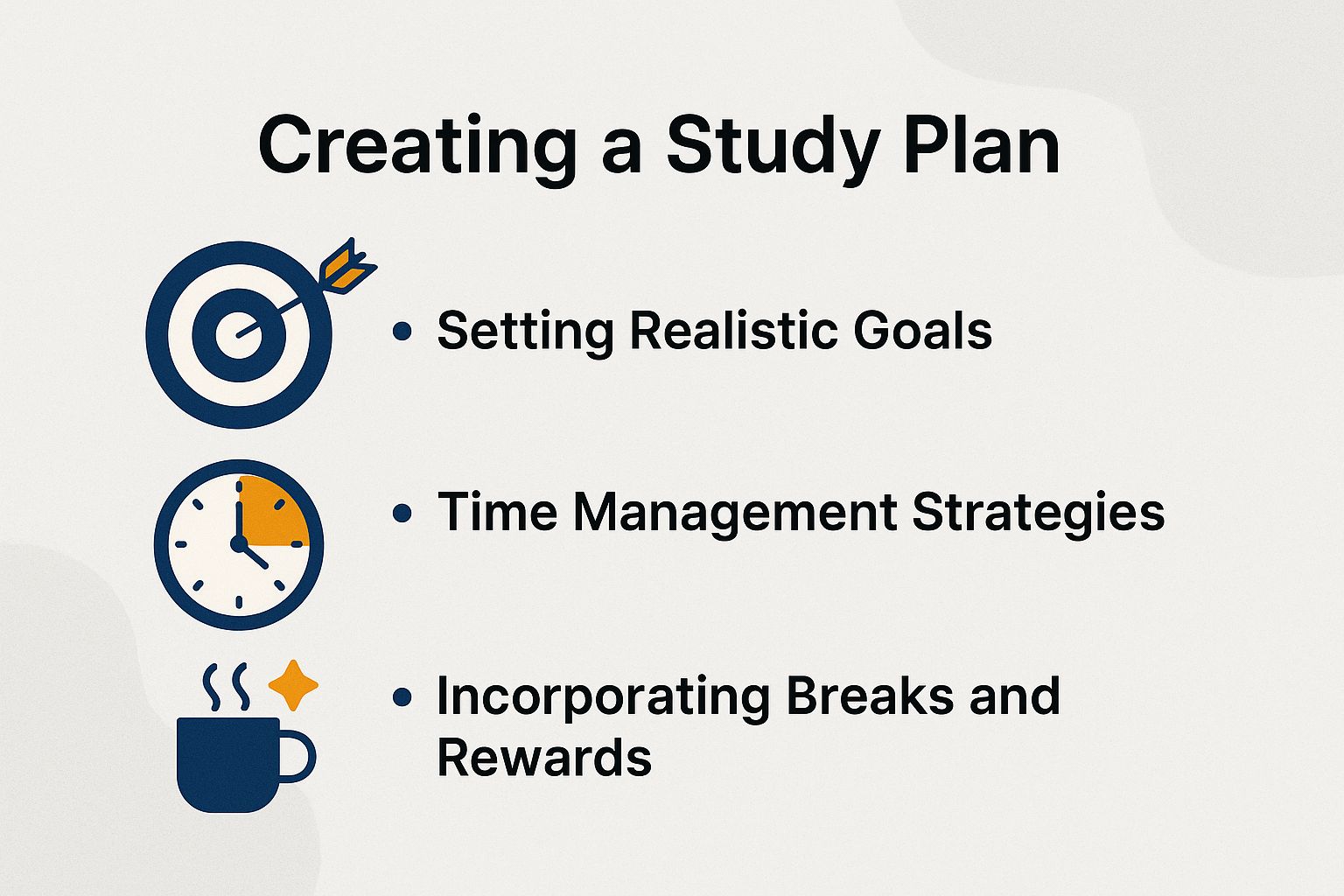
A well-structured study plan is essential for effective preparation for the four plus exam, as it balances review with skill reinforcement.
By organising your study time thoughtfully, you can ensure that you cover all necessary material while also strengthening the skills needed for success. For further guidance on structuring study plans, see also: AI Tools for 11+ Plus Entrance Exams: Parents Guide 2025, which offers innovative solutions to optimise your preparatory efforts.
Setting Realistic Goals
Establishing realistic and measurable goals can significantly enhance a child’s motivation, allowing them to remain focused and committed to their study routine.
Regarding setting goals for exam preparation, it is effective to break down larger objectives into smaller, more achievable milestones. For example, if the ultimate aim is to prepare for a maths exam, one might create a plan that covers topics such as algebra, geometry, and statistics over specific weeks.
Utilising tools like a planner or digital applications such as Trello can help in tracking progress effectively. It is also beneficial to schedule regular review sessions and to reward small achievements along the way, as this can help maintain the child’s engagement and reinforce their commitment to consistent studying.
Time Management Strategies
Effective time management strategies can significantly enhance students’ study sessions, leading to reduced stress levels and increased productivity as they prepare for exams.
One well-regarded method is the Pomodoro Technique. This approach involves studying for 25 minutes followed by a 5-minute break. After completing four cycles, it is beneficial to take a longer break of 15 to 30 minutes.
To help manage your study sessions, utilising tools like Google Calendar or Todoist can be very effective. For instance, you might allocate time on Monday from 4 to 5 PM for maths study, then follow up with history at the same time on Tuesday.
This structured approach not only promotes focused study blocks but also ensures that there is adequate time to recharge, ultimately making study sessions more productive.
Incorporating Breaks and Rewards
Incorporating breaks and rewards into study sessions can significantly enhance focus and promote positive study habits, ultimately making the preparation process more enjoyable. Research suggests that taking breaks can improve cognitive function and information retention by as much as 30%.
To maximise these benefits, consider using the Pomodoro Technique: study for 25 minutes, followed by a 5-minute break. After completing four of these cycles, treat yourself to a longer break of 15 to 30 minutes. This extended break can be an opportunity to engage in activities you enjoy, such as taking a quick walk or enjoying a snack.
This approach not only enhances concentration but also establishes a system of positive reinforcement that fosters consistent study habits.
Resources for Preparation
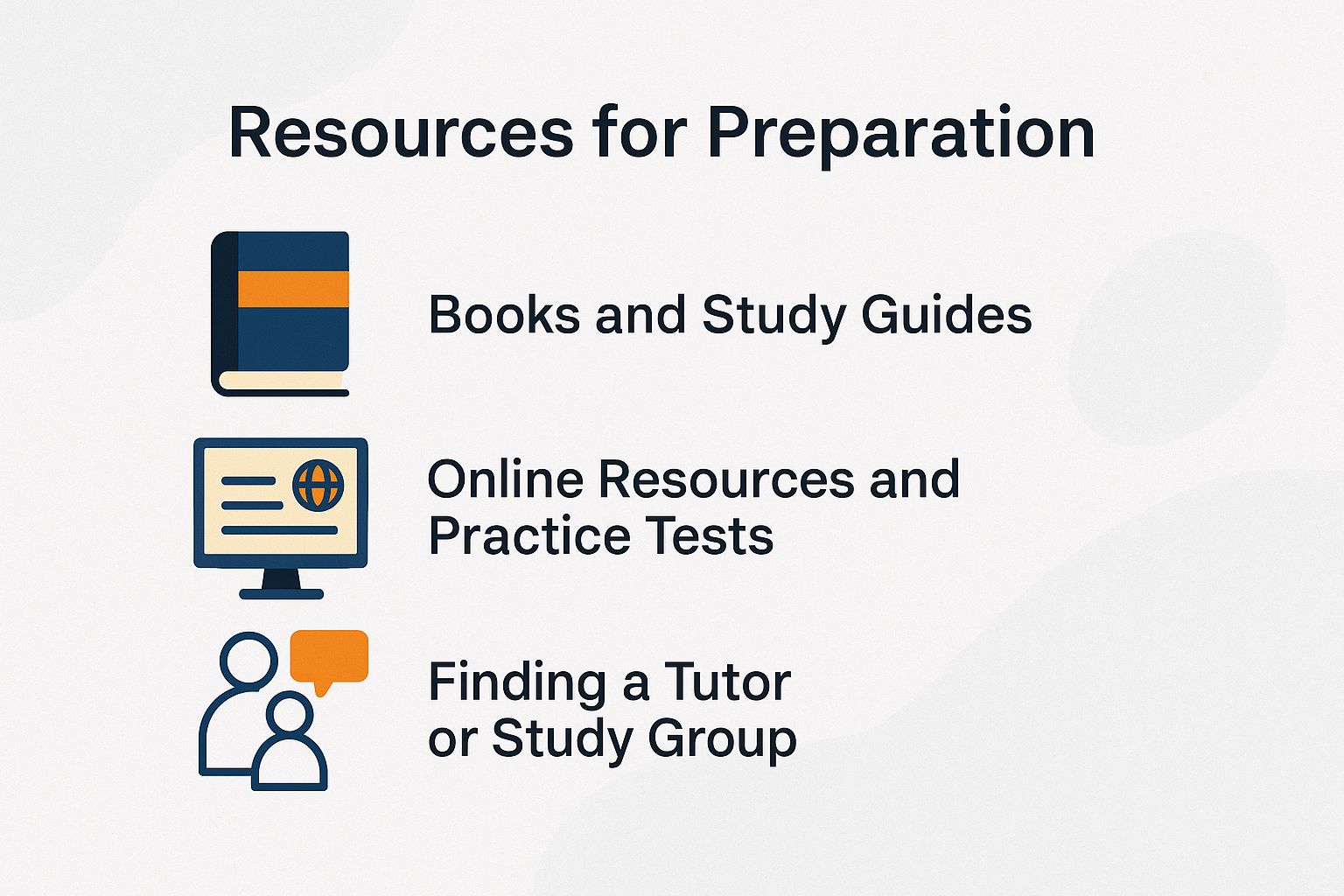
Utilising a variety of resources can significantly improve preparation for the four plus exam. By providing children with different learning materials and practice opportunities, you can create a more effective and engaging study experience. For those looking to expand their preparation strategy, our 7+ Entrance Exams guide offers insight into additional exam formats that may be beneficial.
Online Resources and Practice Tests
Online platforms such as Khan Academy and IXL provide interactive lessons and practice tests that can greatly assist in preparing for the four plus exam.
Along with these resources, it is worth considering Quizlet for its customisable flashcards and quizzes specifically designed for exam topics. The free version of Quizlet allows users to create personalised study sets, while the premium subscription, priced at £35 per year, offers access to advanced features.
Another valuable resource is Edutopia, which provides teaching strategies and study tips that can enhance one’s understanding of core concepts.
By incorporating these tools into your study routine, you can adopt a well-rounded approach, making your preparation for the four plus exam both effective and engaging.
Finding a Tutor or Study Group
Enlisting the assistance of a tutor or joining a study group can offer personalised support and deepen a child’s understanding of challenging concepts.
When searching for a suitable tutor, consider utilising platforms like Wyzant or Tutor.com, which allow you to filter tutors based on subject expertise, experience, and pricing.
Local tutoring centres frequently provide group sessions, presenting a more cost-effective option. Additionally, organising study groups with peers can encourage collaborative learning. It is important to ensure that these sessions have clear objectives, such as reviewing specific chapters or practising particular problems.
Incorporating tools like Google Docs for shared notes or Quizlet for flashcards can significantly enhance the effectiveness and engagement of group study sessions.
Fostering a Positive Mindset
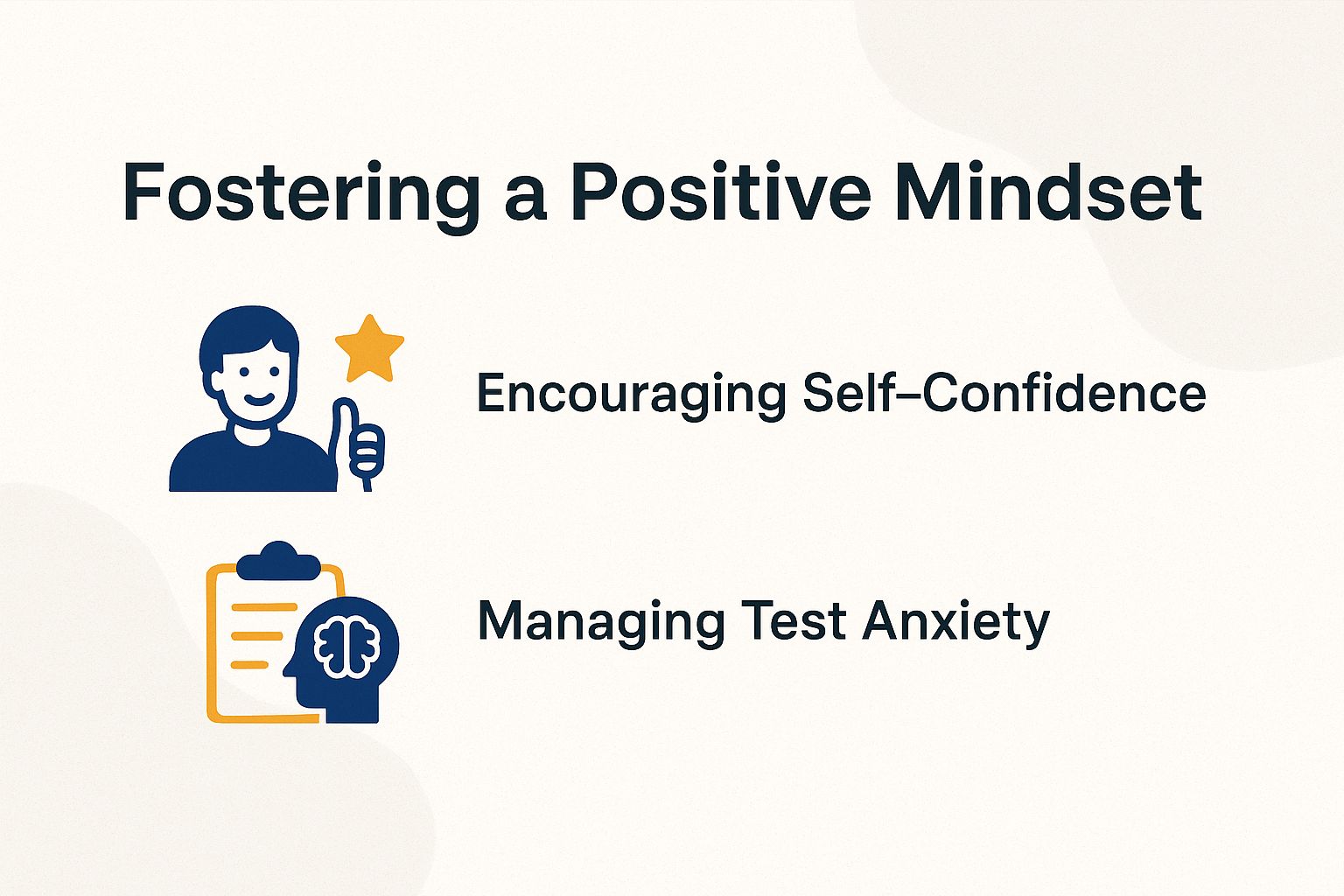
A positive mindset is crucial for students preparing for the four plus exam, as it significantly affects their performance and stress levels throughout the preparation process. Developing resilience, as discussed in our guide on building resilience for exams, can further empower students to succeed.
Encouraging Self-Confidence
Building self-confidence in children can significantly enhance their exam performance, with research suggesting that confident students may outperform their less confident peers by as much as 20%. To nurture self-confidence, parents can adopt several effective strategies.
One approach is to celebrate small achievements, such as completing a homework assignment or mastering a new skill. This can be done through verbal praise or small rewards, which serve to reinforce positive behaviour.
Additionally, positive affirmations can be beneficial; encouraging your child to repeat phrases like “I can do this” on a daily basis can instil a sense of belief in their abilities. When applied before mock exams, these affirmations help children approach tests with calmness and resilience.
Involving children in decision-making processes, whether it involves selecting dinner options or choosing weekend activities, can also enhance their sense of control and competence, further boosting their self-esteem.
Managing Test Anxiety
Managing test anxiety effectively can lead to significant improvements in performance. Research indicates that strategies such as mindfulness and deep breathing can reduce stress levels by as much as 50%.
To navigate test anxiety successfully, it may be beneficial to employ relaxation techniques like progressive muscle relaxation or guided imagery. For instance, you could spend five minutes focusing on your breathing, inhaling deeply and exhaling slowly while visualising a calm and serene environment.
Additionally, preparation strategies, such as creating a structured study timetable, can be quite helpful. Dividing your study materials into manageable chunks can prevent the last-minute cramming that often leads to increased anxiety.
It is also important to incorporate stress relief exercises into your routine, such as quick stretches or a few moments of quiet reflection. Practising these techniques can foster a calmer mindset as you approach your exam.
Practical Tips for Test Day
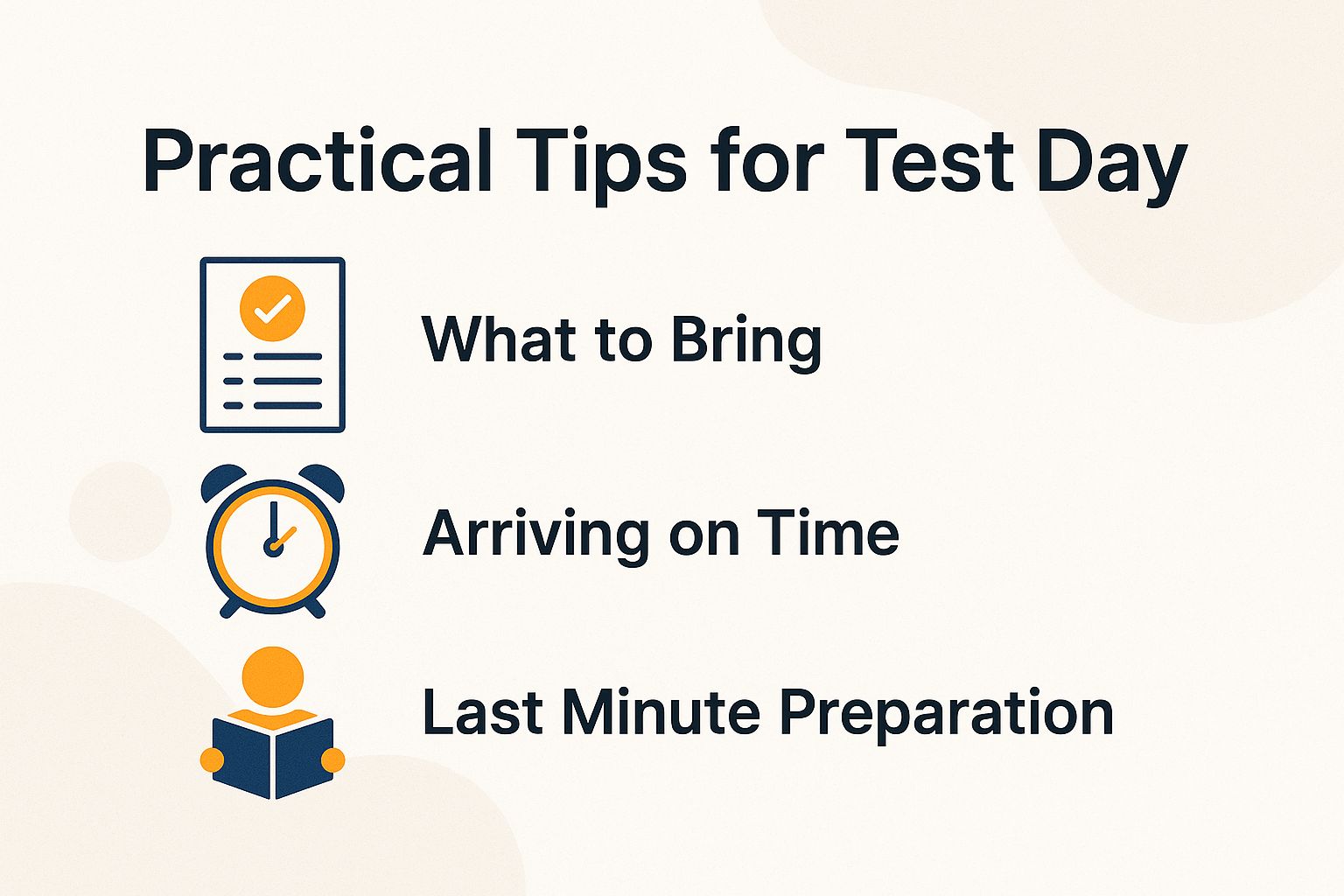
Preparing for exam day involves several practical steps that can help alleviate nerves and ensure that students are fully equipped to perform at their best during the four plus exam. An important aspect of preparation is understanding the subjects covered, which is thoroughly explored in this guide about the subjects covered in the 11 Plus Exam.
What to Bring
Ensuring that children have all the necessary materials for the four plus exam is essential in preventing last-minute stress and helping them focus effectively. To facilitate this preparation, parents should consider creating a checklist of essential items.
Here are some key materials to include:
- Sharpened pencils
- An eraser
- A clear water bottle
- Healthy snacks
- Any permitted reference materials
Additionally, it is important to review the exam guidelines for any specific restrictions. Packing these items the night before can help avoid any morning rush and ensure a smoother start to the day. Encouraging your child to familiarise themselves with their materials can also foster confidence.
By keeping everything organised and ready, you can help minimise anxiety, allowing your child to concentrate fully on the exam itself.
Arriving on Time
Arriving at the examination location on time is essential, as research shows that students who arrive late often experience increased anxiety and feel less prepared.
To ensure a timely arrival, it is advisable to plan your route in advance and allocate extra travel time to account for any potential delays. Utilising apps such as Google Maps or Waze can help you check real-time traffic conditions for a smoother journey.
Additionally, setting multiple reminders on your phone—one for the day before and another on the day of the examination—can help prompt you to leave on time. Preparing your materials the night before guarantees that everything is packed and ready to go. This approach not only reduces morning stress but also significantly enhances your confidence as you make your way to the examination.
Last Minute Preparation
Last-minute preparation should concentrate on reinforcing key concepts and alleviating anxiety, ideally keeping to a maximum of one hour to maintain mental freshness before the exam.
To make the most of your review time, consider using flashcards to quickly test yourself on essential terms and definitions. Writing down critical concepts on note cards can be particularly helpful, especially in areas where you may feel less confident.
Summarising your notes is another effective strategy; condensing chapters or key topics into concise bullet points can significantly enhance your understanding.
It is important to stay calm and avoid cramming. Engaging in practices such as deep breathing or taking short meditative breaks can greatly improve focus and clarity during this vital review period.
Post-Exam Considerations
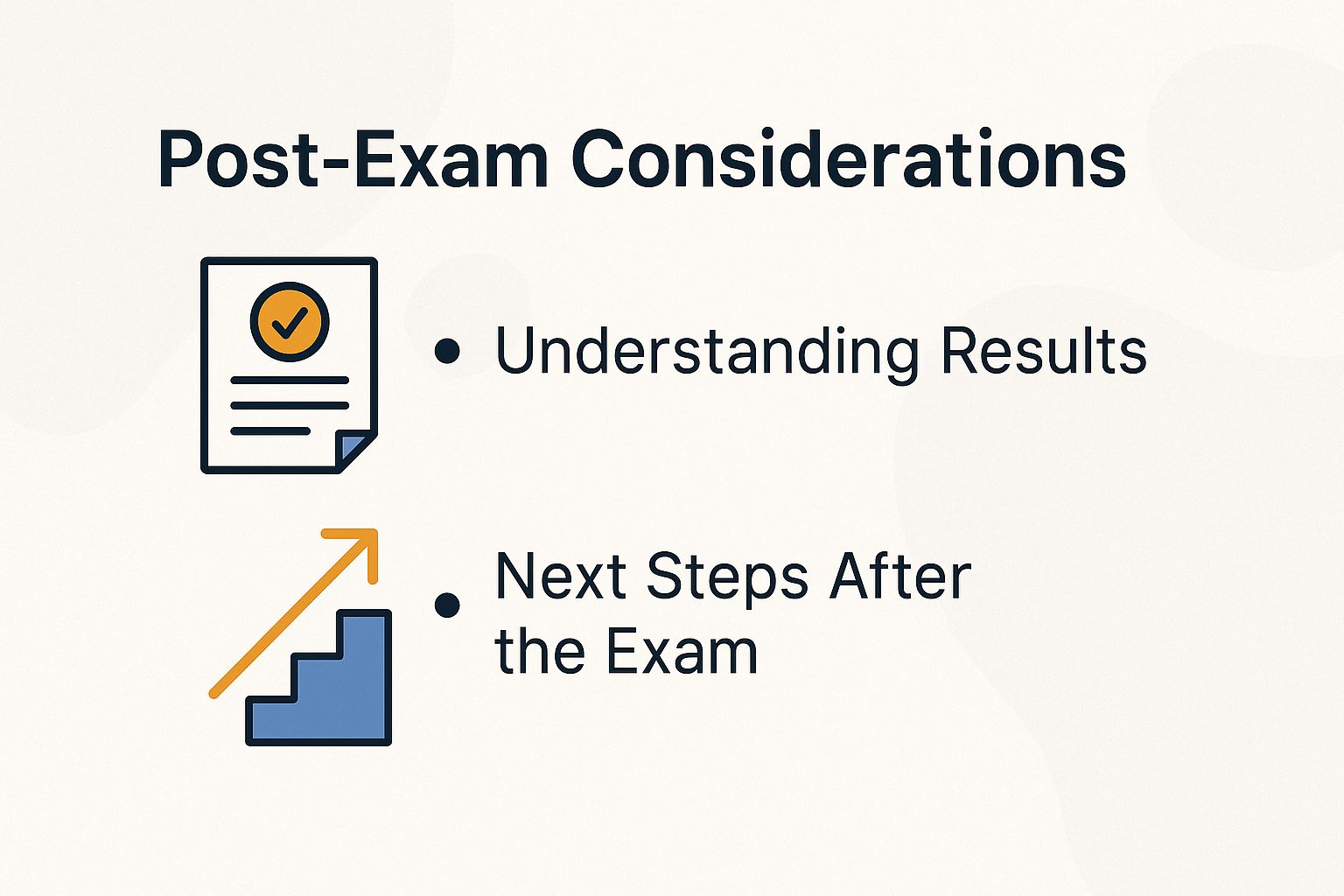
After the four plus exam, understanding the results and deciding on the next steps can significantly impact a child’s educational journey.
It’s important to take the time to analyse the outcomes and make informed decisions going forward.
Understanding Results
Interpreting the results of the four plus exam requires a clear understanding of percentiles and what they reveal about a child’s academic standing in relation to their peers.
A percentile score reflects how a child performed compared to others. For example, achieving a score in the 70th percentile indicates that the child outperformed 70% of their peers. Scores are measured on a scale from 1 to 99, with higher scores representing stronger performance. When analysing these results, it is important to pay attention to both areas of strength and areas needing improvement.
If a child scores below the 25th percentile in reading, it may be advisable to consider targeted interventions, such as reading programmes or tutoring. Additionally, utilising tools like practice assessments can provide valuable insights and help inform future learning strategies.
Next Steps After the Exam
After the four plus exam, parents should explore various options, whether that involves seeking additional support, enrolling in enrichment classes, or discussing the results with teachers.
One effective strategy is to arrange a meeting with the teachers to delve into your child’s performance. It’s helpful to prepare specific questions regarding their strengths and areas where they may need improvement.
Additionally, consider enrolling your child in targeted enrichment classes, such as maths or reading workshops that are available at local community centres or through online platforms.
- Tools like Khan Academy provide free resources that can enhance learning at home.
- It may also be beneficial to connect with a tutor for personalised guidance, as this can significantly boost your child’s confidence and academic skills.
Frequently Asked Questions: Top Advice for Parents Before the Four Plus Exam
What is the Four Plus Exam and why is it important?
The four plus exam is an entrance exam for children seeking admission into top independent schools at the age of four. It is important because it determines their eligibility for these highly competitive schools.
When should parents start preparing their child for the Four Plus Exam?
Ideally, parents should start preparing their child at least a year before the exam. This gives enough time for the child to develop necessary skills and for parents to research and choose the right school.
What are some tips for preparing a child for the Four Plus Exam?
Some tips include practicing verbal and non-verbal reasoning, reading with your child, and exposing them to a variety of activities and experiences. It is also important to maintain a positive and encouraging attitude towards learning.
Is it necessary to enroll a child in a prep course for the Four Plus Exam?
No, it is not necessary to enrol a child in a prep course. However, it can be helpful for some children who may benefit from the structured and focused approach of such courses.
What should parents keep in mind during the exam day?
On the day of the exam, parents should ensure that their child gets enough rest, has a healthy breakfast, and arrives to the exam location on time. It is also important to remain calm and provide words of encouragement to the child.
What should parents do after the Four Plus Exam is over?
After the exam, it is important for parents to remain positive and supportive regardless of the results. If their child doesn’t pass, it is important to remember that there are other options and opportunities available. If their child is successful, parents should continue to encourage and support their child’s academic journey.



